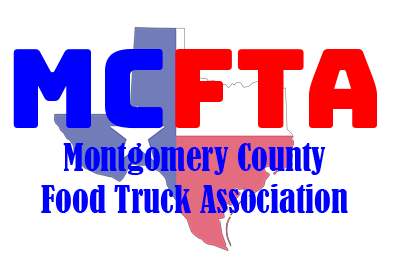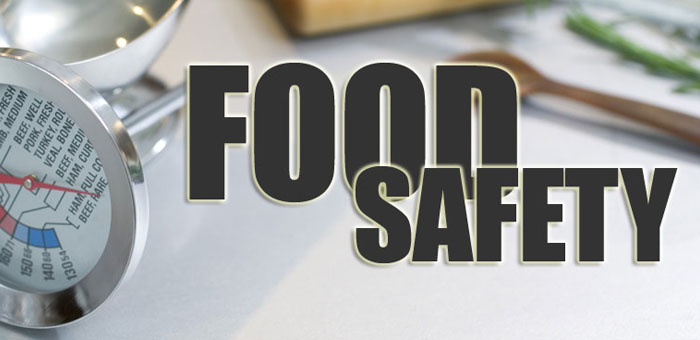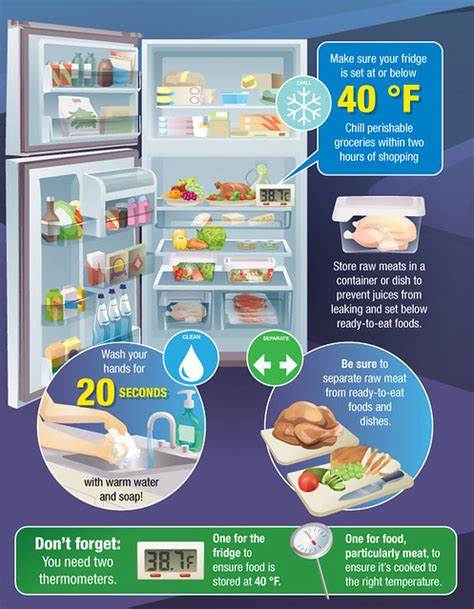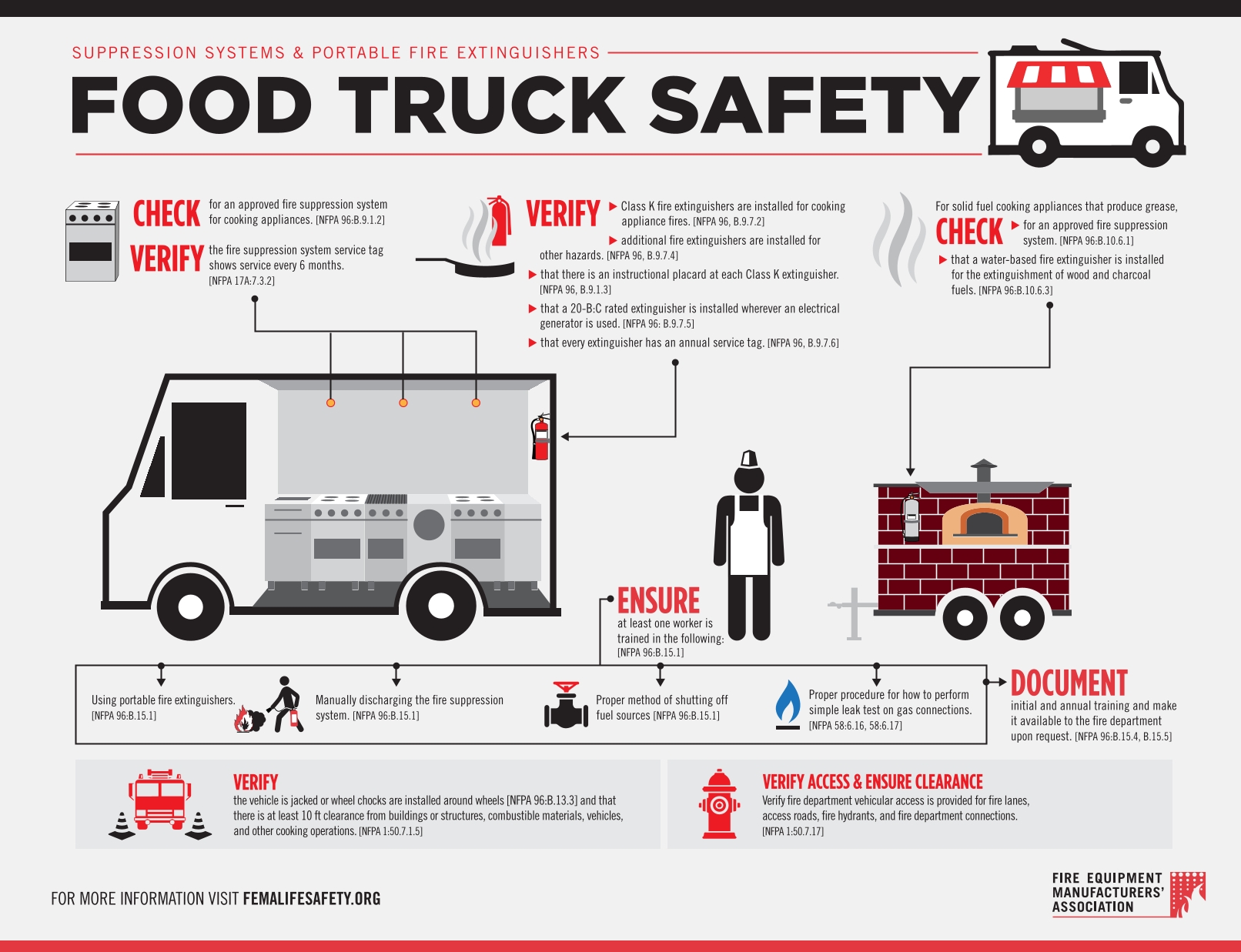Basics of Food Truck Safety
Food trucks continue to gain popularity all over the country, and it’s no surprise why. These mobile food trailers are making a dent in the restaurant industry, whipping up delicious foods from some of the most prominent chefs in the industry.
Up until relatively recently, there were no National Fire Protection Association (NFPA) codes related to food truck fire safety. This all changed in July 2014, when disaster struck a food truck in Philadelphia. During this tragic event, gas from a leaking propane tank ignited, and the resulting explosion killed a mother and daughter food truck operating team while injuring up to 10 bystanders. This tragic incident prompted a new chapter of NFPA 96.
Mobile and temporary cooking is addressed in Section 50.7 of the 2018 edition of NFPA 1, Fire Code, and Adoptable Annex B of the 2017 edition of NFPA 96, Standard for Ventilation Control and Fire Protection of Commercial Cooking Operations.
The purpose of placing the language in Annex B of NFPA 96 was to allow for the jurisdictions who do not currently adopt/enforce NFPA 96 to adopt solely this annex to address mobile/temporary cooking specifically.
Tips To Prevent A Food Truck Fire
- Did you know that more than half of the fires in the food service industry involve cooking equipment? That’s why many mobile food truck owners have invested in an automatic fire suppression system. This system will shut down the fuel supply and douse the fire with chemicals to extinguish the flame quickly and efficiently. Make sure to have your fire suppression system professional inspected semi-annually as well.
- Since you never know when an accident will occur, make sure you have portable fire extinguishers within reach at all times. From the smallest flame to a big grease fire, these things can save your life.
- Depending on the type of cuisine you serve, you probably use a few different types of cooking equipment in your food truck. From stoves to BBQ smokers and microwaves, it’s important to schedule routine inspections so you can identify safety hazards ahead of time. A routine inspection will help you keep an eye on frayed cords and combustible items that may be stored near fuel sources.
- Another way to prevent a fire in your food truck is to schedule exhaust hood inspections to remove any grease buildup. The NFPA 96 requires grease removal in mobile food trucks monthly, quarterly, or semi-annually depending on your cooking volume and whether you use wood or charcoal to cook.
Train Your Staff In Fire Safety Basics
Another important aspect of food truck fire safety is to properly train your staff on the basics of fire safety. By teaching your staff the tips below, you can take further preventative steps to ensure your food truck is fire-free.
- Don’t throw water onto a grease fire. While this may seem like the right thing to do in the heat of the moment, throwing water on a grease fire will cause the grease to splatter, which can spread the flames even more.
- Get comfortable using a fire extinguisher. Some establishments offer professional fire extinguisher training for small businesses and their employees which can help your staff get more comfortable with the idea of using one.
- Make sure to train all new employees and consider offering a yearly refresher course for everyone in your company.
- If your food truck utilizes wood or charcoal-burning ovens, make sure to remove the ashes at least once a day.
Store any flammable liquids in their original containers and place them in a well-ventilated place. Make sure they are clear of combustible items and sources of heat.
Prepare An Emergency Plan
When a fire breaks out in your mobile food truck or concession trailer, your staff must take control of the situation immediately. When an emergency occurs, make sure you’re prepared to do the following:
- Make sure at least one of your employees during each shift knows how to power down your food truck. Show them how to shut off the propane and electrical power in case a fire breaks out.
- Take the time to design an evacuation plan. Designate one staff member per shift to be the evacuation manager. This person should be in charge of calling 911 when an emergency occurs, and they should make sure all other employees have left the food truck safely.
- Offer emergency training to your employees. Teach each member of your staff about the proper evacuation procedures and the usage of any fire-safety equipment.
Tips to Ensure Food Safety on Your Truck
Food truck management can be simplified and standardized to reduce the risk of foodborne illnesses, as well as encourage the…
Safety practices for propane tank refill and distribution
GENERAL INFORMATION Make sure that your propane container, piping, and appliances installed on your mobile food vending truck is in…
Food Safety Tips for Your Food Truck
If you’ve already started your own food truck business, you probably had to learn the ins and outs of food…
- « Previous
- 1
- 2
Generator Operation Safety
Give the generator proper room to breathe. For the safety of your food truck and staff, we don’t recommend operating your food truck indoors. However, if for whatever reason, you need to operate your food truck in a covered space, make sure to have the proper ventilation for the carbon monoxide to escape from your generator
The generator and its muffler can get very hot during operation and with food truck events lasting for multiple hours, caution is necessary. Be sure to approach your food truck’s generator with caution when touching it after the generator has been running to avoid damage or injury.
Do not store gas for your generator or food truck indoors. Vapor from gasoline is heavier than air and can travel invisibly along the floor. It can be ignited by a pilot light or other source of flame such as an electric spark
Before you begin operating your generator, be sure to read and adhere to your owner’s manual. If you have any questions regarding your specific generator, we recommend consulting your generator’s manufacturer.
Propane Safety
We recommend having a qualified propane service technician regularly perform a leak test on your food truck’s propane systems. If, for any reason, you smell gas, there are a few precautions that you need to take:
- Immediately extinguish all smoking materials and open flames
- Get everyone out of the area if you suspect the gas is leaking
- Turn off the gas supply valve of your propane tank if it is safe to do so
- If you feel that there is a propane leak and you can’t contain it, please step away from the leak and contact your propane supplier. If you cannot reach them, call emergency services in your area.
If you own and operate your own food truck, it’s important to take the necessary precautions to ensure your food truck is a safe environment for your employees and customers. A fire could devastate your food truck business, and could even put your life at risk.



